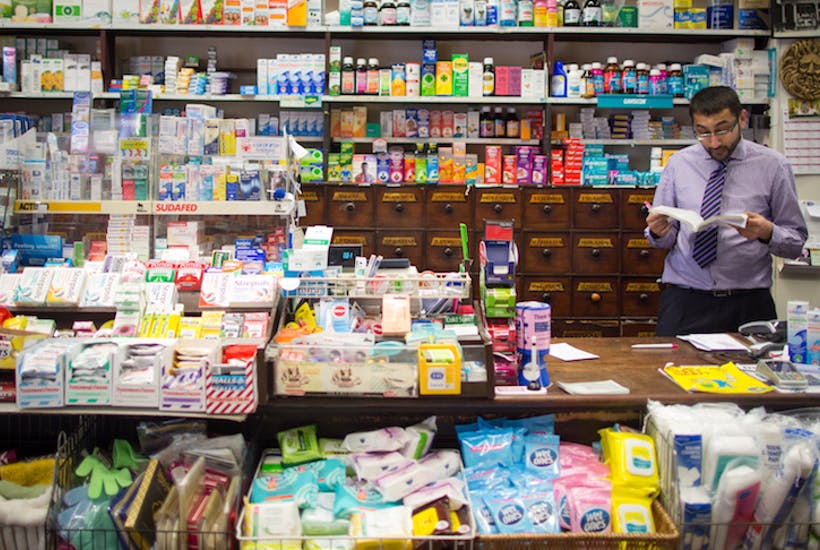I’ve had a number of embarrassing run-ins with pharmacists. I discovered my daughter had headlice three days into our holiday in Pisa and was forced to mime both insects hopping and head-scratching for the benefit of an apparently drunk Italian chemist who claimed not to know a single word of English. This was nothing on having to shout about my need for the morning after pill for the benefit of a hearing-impaired teenager in a white coat and a lengthy queue of customers listening intently. But never has a pharmacist commented on my weight.
This might be about to change. Under new guidance from the National Institute of Health and Care Excellence (NICE), chemists are being urged to chat to customers about diet, alcohol consumption and smoking. They could then go on to suggest lifestyle changes or recommend a GP’s appointment. Both the NHS’s Chief Pharmaceutical Officer and the government’s primary care minister have stressed the important role played by pharmacists in providing accessible and approachable (not to mention cheap) health advice.
We can only imagine how these conversations might go. Presumably, requests for the morning after pill will be accompanied by a recommendation not to open the second bottle of wine next time. Indigestion? Stay off the fatty food. Calpol, nit lotion and a tube of athlete’s foot cream? You look like you could do with losing a few pounds. Just want to pick up a prescription? Let’s discuss that pack of cigarettes sticking out of your jacket pocket.
Such cringe-inducing interventions are justified as a way of solving the nation’s obesity crisis while simultaneously reducing costs to the NHS. Win win! Apparently, in 2018-19 there were almost 1.1 million hospital episodes involving a diagnosis of obesity, up from 884,000 the year before. But there are reasons to be sceptical of these figures. ‘Involving a diagnosis of obesity’ does not mean that a patient’s weight was the primary cause of their hospitalisation. They may have cancer or a broken leg and just happen also to be overweight. The definition of obesity – adults with a Body Mass Index over 30 – has also been called into question. The crude measure based on height and weight fails to differentiate between fat and muscle tissue. This means that professional rugby players who train daily and follow a strict diet are often labelled obese.
Having pharmacists tell customers that they could do with shedding a few pounds each time they pop in to stock up on paracetamol is unlikely to encourage weight loss – though it may well raise blood pressure. Most people who are overweight know when they are looking a bit plump. What’s more, they also know what to do about it: eat less and do a bit more exercise. If people choose not to lead their lives according to the latest NHS guidance it’s unlikely to be because they’ve convinced themselves they are a dead ringer for Kate Moss or David Beckham.
We reject health advice because we are happier that way. We decide that more pleasure is to be gained from eating cake than fitting into skinny jeans. A glass of wine at the end of the day is something to look forward to and a quick fag break relieves stress or boredom. Whatever the reason, every single day millions of people conclude that NHS guidance may be scientifically proven to turn us all into long-lived models of human efficiency but that’s not what we want out of life and no amount of nagging from pharmacists will persuade us to change our minds.
New tactics to push us into getting with the programme demand we think not of ourselves but of the national treasure that is our NHS. The cost of all those extra hospital visits made by people who are obese or smoke or drink too much are, apparently, a drain on the already over-stretched health service. Forget for a moment that the taxation raised from cigarettes and alcohol provides a good deal of funding for hospitals. Forget that there are relatively few chain-smoking bed-blocking nonagenarians. The beauty of the NHS is surely that it is free for all at the point of use – and this is irrespective of whether you smoke 20-a-day or break your neck while horse riding.
Hearting the NHS seems to have become an intrinsic part of British identity. But appreciating the fact that there’s a hospital when we need one should not mean we have to endure being hectored about our lifestyle every time we need a pack of paracetamol. Being lectured about the importance of living according to NICE-approved rules risks turning people away from high street chemists altogether and promoting the use of online pharmacies. Redundant pharmacists benefit no one but at least my computer doesn’t nag me when I reach for the biscuits – yet.







Comments